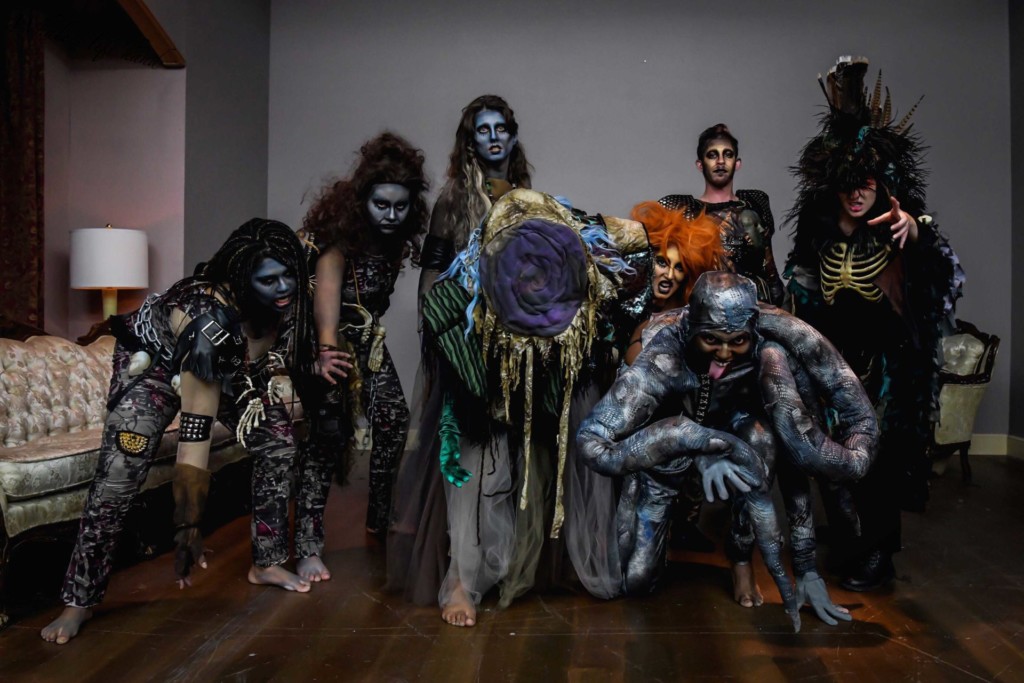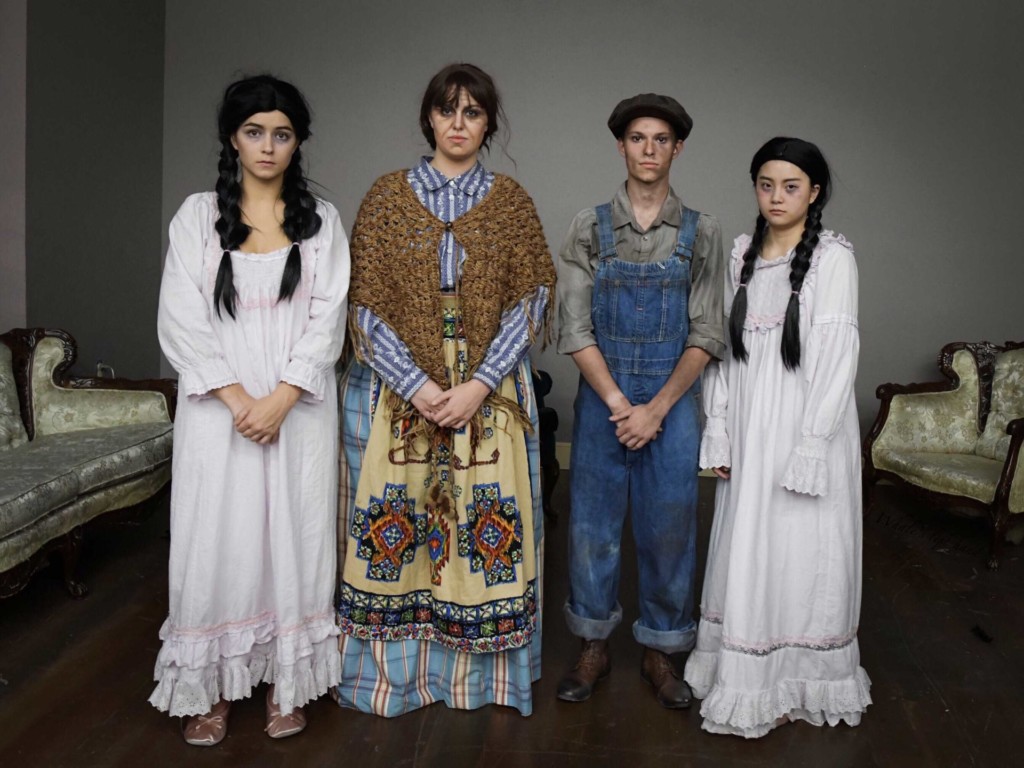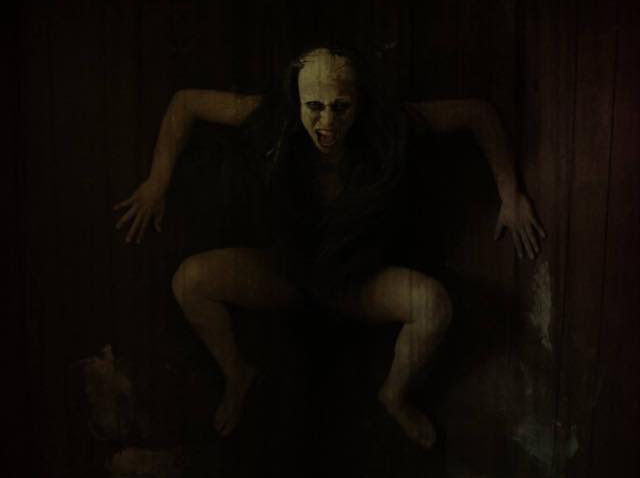“Incubus,” the first immersive theater experience at the School of Acting, plunged audiences into horror in a transporting cross-department collaboration
By Cristina Schreil
Huddled in a group, we plunged into darkness. As eyes adjusted to the film studio at 466 Townsend, now a darkened setting ripped from the turn of the 20th century, we saw girl in a billowing nightgown weeping on the ground, a faint wash of light around her. We couldn’t help but sense she was not alone.
Director Hector Zavala stepped out to explain that this was Sarah. We were in a building that was a wool factory in 1906, at the time of the great earthquake. With that, he leaves—and we’re thrown straight into the action. Through sobs, Sarah said they visit her at night. She hears their nails against the floor. Quickly, there’s no need to guess at who “they” are—they’re everywhere. Demons emerged in jagged silhouettes from the inky background, gasping and howling with guttural growls befit for zombie nightmares. One jumped toward us, screaming so wide we could see its gums. Another yanked on Sarah’s gown and whipped her backward. Suddenly, Sarah was pinned against a wall in a bed; demons snarled around her and lurched their barbed limbs toward her buckling body.
As is typical for immersive theater experiences, the story unfolded around us. We turned to watch a scene through an adjacent window. An actor guided us through a maze-like space. Scenes occurred in different rooms. All along, demons hungry for bodies to possess slinked out from shadows or corners, hovering within inches of yelping audience members as we followed Sarah on her journey.
This is my experience seeing—witnessing, rather—“Incubus,” an immersive horror play by the Academy of Art University’s School of Acting (ACT) this past Halloween. It’s the first time ACT has put on this kind of interactive theater production. Audiences cycled in 30-minute increments. Think of it as a haunted house-meets experimental theater experience. Audiences apparently were eager to jump in: the show sold out before opening night.
A team from the School of Fashion (FSH) provided vivid, captivating costuming for characters ranging from the period characters to fearsome demons. In our experience of “Incubus,” the costuming—led by instructor Alina Bokovikova and costume production supervisor Bethany Deal—was as pivotally transporting as the acting. Creepier characters benefitted from bolder costuming. A shock of feathers jutting forth from the headpiece of a shaman (a commanding Dakota Jenkins) seemed to vibrate with intensity before a demon emerged from behind.

“Incubus” is the brainchild of Zavala, a playwright, actor, director, and immersive theater veteran with acclaimed works spanning the Bay Area to Mexico. He wrote “Incubus” with his longtime writing partner and with help from Executive Director of the Schools of Entertainment Jana Memel. It’s based on culling historical research from several places, but mostly focusing on the history of the area around 466 Townsend.
“The objective of alternative spaces or immersive theater is to change people’s space,” Zavala said at the start of the rehearsals phase. In a past play he directed, he had actors play impoverished characters in a literal dirt pit outdoors.
Yet for the students participating in “Incubus,” it’s also a learning experience. “My main objective is to have the acting students develop a much clearer understanding of what searching for an objective is as an actor,” Zavala said. “The beautiful thing about this experience is the actors are not only working with a scene partner but they’re also soliciting an objective from the audience.” The latter is interesting, and a new experience for most actors on the cast, who had never done an immersive theater project. Many students were in their first year in ACT. “I work from the outside in. If I start telling you to bring your hand up, after two or three times you also get an emotion,” Zavala said of his method. “It’s just a different process and a different language. It’s been fun for them.”
Embracing physicality is key for safety, too. “You also have to remember that it’s a horror play. People are even more unpredictable when they’re scared,” explained Kenzie James, one of two actors playing Sarah. Her part is more physical; she contorted and resisted demonic takeover as another Sarah monologued to the audience. “If someone gets too scared, they can run across the room … if they’re running across the room while we’re doing a lift over here, you literally have to be prepared for everything at all times.”

James explained this was a collaborative effort by the cast and crew. It’s collaborative with the audience, too. There’s no fourth wall. The play differs each time.
According to stage manager Yamu Wang, this is why it’s critical for actors to know their roles. “This kind of theater, you have to understand your character first, and then you have to make characteristic choices to react and act in the moment,” Wang said, an ACT graduate who also shared that improv was a part of the audition process.
Actor and graduate student Yutong “Maggie” Tao played the other Sarah—who sobbed at the start of the play. “I want to know her background and the details,” she said at one of the rehearsals. “[So] I can see her very clearly.” Tao said she’s been journaling about this and sharing her insights with Zavala. It’s part of a deeper dive that’s informed her entire ACT education. “Before I had acting class in America, I thought acting was so easy—it’s about life! But after I learned acting, [I know] it’s not. You need to act something you don’t know and didn’t experience before,” she said. “You need to always observe people.”
As “Incubus” reached its climax, there was a sense that all actors’ eyes were on the audience. By then, we were all holding hands as we shared a claustrophobic sense that all hope was lost. After being led by actors through the darkness, we were told to run. And we did—toward the light outside.
